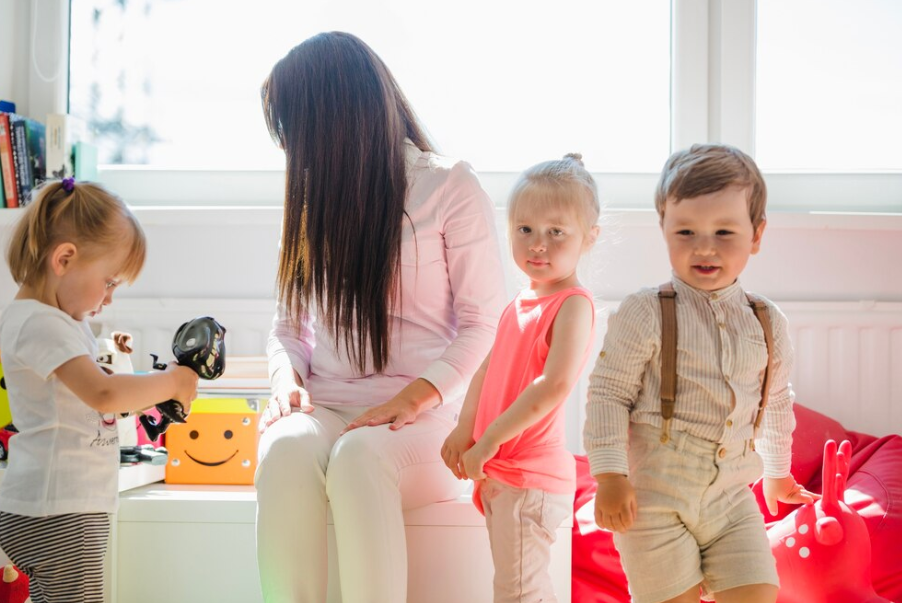
Source: Freepik.com
Quality daycare for children incorporates age-appropriate activities – ranging from educational to skills development, storytelling, arts and crafts, and solving problems.
If you want your child with all these skills and abilities at an early age but are unsure of whether daycare can help you achieve what you wish to or not, fret not!
In this detailed blog post, we’re going to uncover some influential ways in which daycare helps in children’s development so they can walk through all the aspects of their life.
1. Fosters Emotional Connections
Spending time in daycares helps children interact with both caregivers and peers. The role of caregivers in this environment is crucial, as they provide a nurturing and supportive atmosphere that contributes significantly to fostering emotional connections in children.
When children interact with their fellows and caregivers on a regular basis, their sense of belonging and empathetic behaviors will skyrocket. Daycares nurture children’s understanding of their own emotions and develop caring elements for others.
Children learn to establish secure attachments that will improve their emotional well-being and resilience. Hence, with the growing age, they’ll become more sensible to deal with every situation both emotionally and strategically.
2. Promotes Routine and Schedule
In a daycare setting, well-thought-out time management and scheduling also instil the significance of routine in young minds. Children engaging in a day filled with designated times for different activities are more punctual than at home.
They develop a sense of security and predictability while playful exploration, learning activities, snack breaks, and rest periods.
An all-inclusive and strategized routine provides a reassuring structure for children, helping them feel more confident in managing their expectations and behaviors and contributing to their development as a whole.
3. Improves Social Skills
In the shared environment of daycare, children are surrounded by peers, which serves as a perfect setting for honing critical social skills. They play and learn together and engage in collaborative activities, which will develop abilities to share, cooperate and communicate effectively in them.
All these interactions facilitate great opportunities for children so they can make new friends, navigate friendships and work through conflicts. Helping others and staying empathetic with them will lay the groundwork for healthy social connections in the future.
4. Develops Problem-Solving Abilities
Daycare offers a dynamic environment where children regularly face various challenges while playing and learning activities. No matter if it’s convincing friends to share toys or figuring out how they can solve a puzzle, their minds start working sharply.
In other words, these challenges spark critical thinking and creativity in children. Learning problem-solving skills will help them deal with both minor and major conflicts during play and learning time. As a result, they’ll have the ability to approach challenges with confidence and resilience.
If you’re a Calgary NW-based resident and want to make your child an excellent problem-solver, find the best daycare in Calgary NW with expert staff. They will train your child with proven problem-solving techniques so they will feel more empowered in any situation.
5. Eases Transition to Primary School
Most children attend daycare where caregivers and other staff equip them with the skills and mindset required for the structured world of primary school.
With time, they become more excited while being apart from home. Observing new rules and participating in group activities will make them more determined to pursue their schooling.
Daycare staff strive hard to provide children with a more formal education environment, which will ease their transition to primary school. Therefore, they will experience a smooth and ambitious entrance to primary education, reducing the anxiety often associated with this transition.
6. Maintains a Balance Between Play and Learning
Top-notch daycare programs are built in such a way that proactively combines learning and playing together. By incorporating educational opportunities into playful experiences, caregivers can boost cognitive development while preserving the joy of learning.
Most children aren’t interested in learning and education; that’s why their parents admit them to daycare centers. The playful educational activities not only enhance intellectual engagement but also cultivate a lifelong enthusiasm for education among children.
7. Enriches Cultural Experiences
Daycare centers play a vital role in celebrating diversity by incorporating various cultural elements into their curricula. These centers expose children to different traditions, languages, and customs, fostering an appreciation for diversity and inclusivity from an early age.
Such exposure helps to broaden children’s perspectives, cultivating respect and curiosity for the cultures of others. Once the children get free from daycare, they will actively engage in cultural activities throughout their lifetimes.
8. Enhances Cognitive Development
Engaging in a diverse array of age-appropriate activities allows children in daycare to participate in hands-on learning experiences that significantly bolster their cognitive abilities.
From immersive storytelling sessions and creative arts and crafts to exciting science experiments, these activities spark curiosity and encourage critical thinking. These outcomes will pave the way for their future academic achievements.
Wrapping It Up
Daycare benefits children in many ways – equipping them not only for academic pursuits but also for varying experiences of life ahead.
In most cases, children suffer from daycare negligence; to avoid this, you need to choose the right, certified daycare for your child. Enrolling your child in a quality childcare program can give them a strong start in life and set them up for future success.